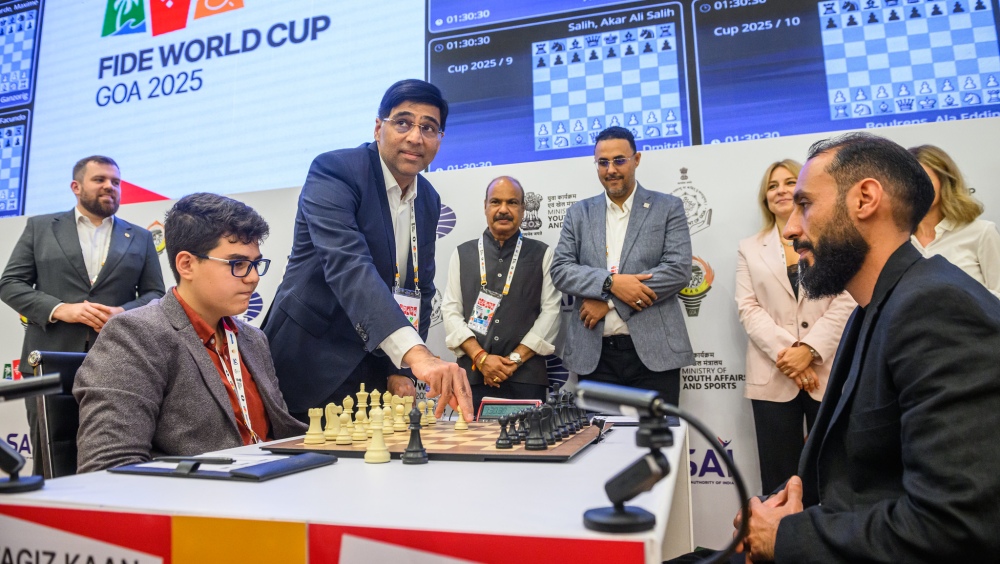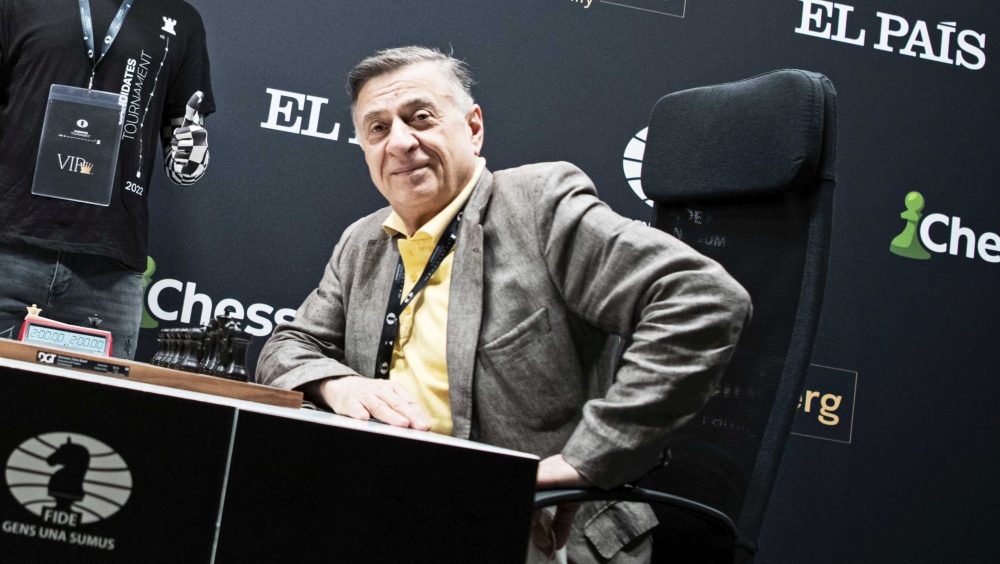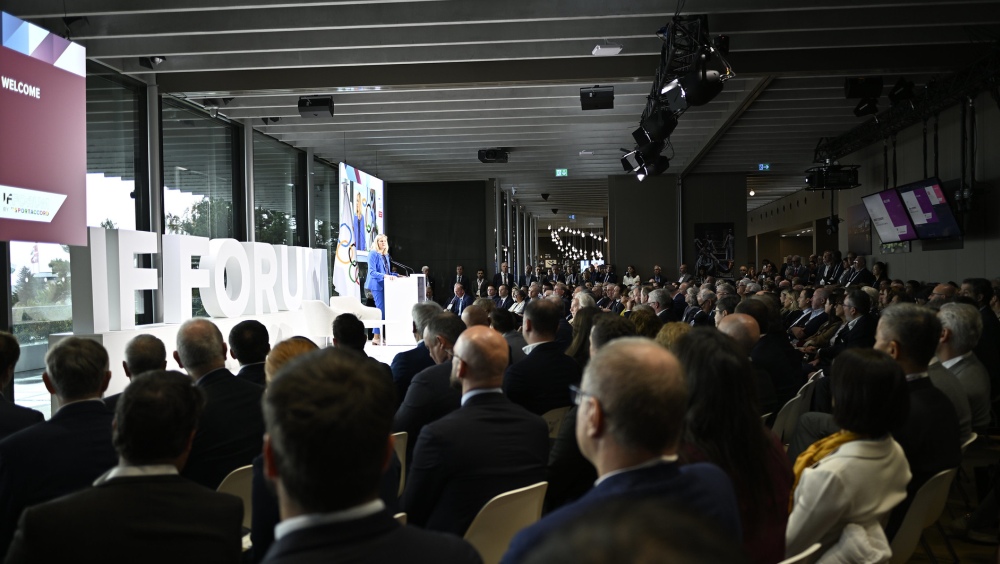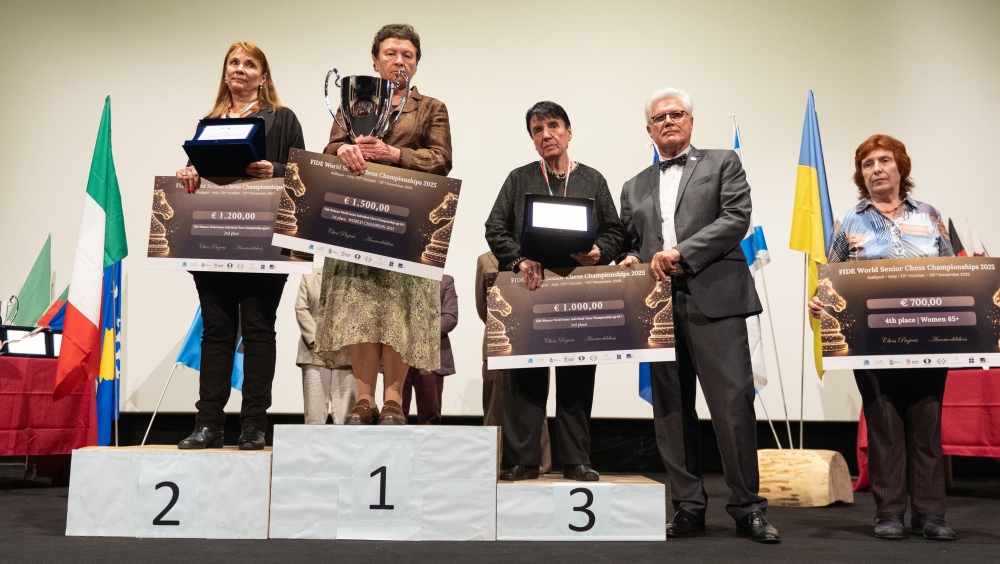FIDE World Cup R1 Day 2: Favourites advance, but drama awaits in the tiebreaks

With the gradual arrival of most of the top 50 seeds, the second game of round one commenced on time in the convention hall of the Baga Resort Rio in Goa. Among others, I spotted elite 2700+ GMs Nodirbek Abdusattorov, Shakhriyar Mamedyarov, Javokhir Sindarov, Vladimir Fedoseev, and Jorden van Foreest acclimatising to the new location. I also had the pleasure of having lunch with the 13th seed, Le Quang Liem from Vietnam. Commentator Jan Gustafsson noted that players might need a bit more time to adapt: “Two days seem to be cutting it rather close if you arrive from a distant time zone.” Top Indian Olympiad player Vidit Gujrathi obviously doesn’t have this disadvantage, though he still enjoyed a relaxed stroll around the playing hall toward the end of the round. More top players are expected to arrive throughout the day, with the rest of the field assembling at the venue tomorrow — eager to learn who they will face in the second round of the knockout. All of them, including World Champion Gukesh D., will join the action in round two. The venue welcomed a very special guest to perform the ceremonial first move. Vishy Anand — former five-time World Champion and current FIDE Deputy President — opened the round by playing 1.c4 for Turkey’s Yagiz Kaan Erdogmus on board one. The move was met with 1…e5, played on behalf of his opponent, Abugenda Nagi of Libya, by Mr. Ali Fouzi, President of the Libyan Chess Federation. Just fifteen minutes into the playing session, three players had already secured qualification to the second round. Amin Bassem, Étienne Bacrot, and Nikita Petrov were each awarded victories by forfeit after their opponents failed to appear for their two-game matches. Barbadian International Master Orlando Husbands, however, arrived too late for the first game of his match but eventually made it to the venue and put his opponent — top German Grandmaster Frederik Svane (2640) — to the test. Though he ultimately lost and was eliminated, he fought valiantly and made his presence felt on the board. Over the following hours, the hall was filled with deep concentration. As I moved among the tables in search of the most compelling encounters, the atmosphere was almost tangible — focus at 100%, and the tension of high stakes evident on every face. The first decisive result was confirmed shortly after the midpoint of the round. American 15-year-old prodigy Andy Woodward scored the opening victory of the afternoon, defeating India’s Gusain Himal with a convincing 2–0 overall score. Playing with the black pieces, Woodward had already seized the initiative. With his last move, 19…Ngf4, he attacked the pawn on g2. White needed to eliminate the knight immediately, but after just three minutes of reflection, Gusain blundered with 20.Kf1?, allowing 20…Nxg3+ 21.fxg3 Nh5!, creating the decisive threat of 22…Nxg3, which would win material. The strength of the bishop on a7, dominating all the dark squares around White’s king, became apparent. Recognizing the hopelessness of his position, Gusain resigned soon after. With this victory, Woodward advances to face a formidable opponent in round two — Austria’s Kirill Alekseenko (rated 2679). As more results began to come in, attention turned to one of the most anticipated encounters of the day — the game featuring one of the youngest participants in the tournament, 14-year-old Argentinian prodigy IM Ilan Schnaider (rated 2401), against former European Champion Aleksandar Indjic, a strong Serbian Grandmaster rated 2635 — and, at 6’8″, arguably the tallest GM in the world! Having lost the first game, Schnaider needed a victory to force a tiebreak. After the opening, he had exactly the kind of dynamic position he was hoping for. The Serbian’s king on d7 was in serious trouble in this chaotic position, clearly favorable for White. Schnaider spent nearly fifteen minutes here, weighing his attacking options, before deciding on 17.Nf4, and ended up just slightly better. However, he missed a golden opportunity to press for the full point. Instead the move played, he could have launched a powerful assault with 17.Qa4+! The key idea is after 17…c6 fails to 18.Be7! attacking the queen and preparing dangerous follow-ups such as Qa3–d6 or Re4. It’s likely that a player of Schnaider’s caliber examined this line but dismissed it due to the absence of an immediate tactical breakthrough. Needing only a draw to advance, Indjic chose to simplify the earliest opportunity and calmly secured qualification after a draw in a double-rook endgame. Yesterday’s biggest upset came when Chilean GM Cristóbal Henríquez Villagra unexpectedly lost on time in a theoretically drawn endgame against an opponent rated 150 points lower. Determined to make amends, he struck back today with an impressive attacking victory that forced a tiebreak. Henríquez Villagra concluded the game in style with the precise and elegant 45.Re8+!. The point is simple yet beautiful: after 45…Qxe8, White delivers a classic “Dovetail Mate” with 46.Qd6#. A clean and instructive finish — and a fitting way to erase the memory of yesterday’s disappointment. Combination of the day It’s always difficult to single out the best combination of the day — with so many great games unfolding simultaneously, it’s nearly impossible to keep track of them all. Nevertheless, Spain’s number one, GM David Antón Guijarro, secured his 2–0 qualification to the next round with a brilliant queen sacrifice against Angolan IM David Silva. Silva has just played 31.Rea1, threatening Ra7 and giving up his bishop on g5, in order to seize control of the seventh rank and threaten the f7-pawn. Antón thought for a few minutes before confidently accepting the challenge with 31…Bxg5. After 32.Ra7, he stunned the spectators by sacrificing his queen: 32…Qxa7! 33.Rxa7 Rf6!, attacking White’s queen and turning the tables completely. After 34.Qd1 Rxf2, Silva resigned. A spectacular illustrative line might be 35.h3 Rxf1! 36.Bxf1 Be3+ 37.Kg2 Bxe4+, with a decisive attack. It’s clear that Antón had foreseen this entire sequence before giving up his queen — a testament to both courage and calculation. Meanwhile, the recent Women’s World
Ljubomir Ljubojević turns 75

Photo: Stev Bonhage Today, the one and only Ljubomir Ljubojević turns 75. A brilliant star—once ranked world #3, and arguably the strongest of all when on fire. Colorful and explosive, he was never built for steady, pragmatic success at the board—but oh, how high he soared! Debuting at not quite 23 years old in the Interzonal in 1973, Ljubomir started with 5.5 out of 6, then reached 8 out of 11, though he missed victory in his key game against rival Lajos Portisch. And, as happened to him more than once — and would again — he tragically rushed in the famous game against Bronstein, with more than two hours on his clock versus just a few minutes for his opponent. Instead of a win came a painful loss, and Ljubojević cracked, finishing in the middle of the standings. Photo: Douglas Griffin on X That failure seems to have left an indelible mark on the sensitive grandmaster. Despite regularly ranking among the world’s top ten, time after time he was overtaken by more determined—and sometimes simply luckier—colleagues, and he never qualified for the Candidates. Still, looking at the ever-cheerful grandmaster, no one would have said he was unhappy. The soul of any chess gathering—vivid, emotional, fluent in five languages and quick to analyze in five more—he was a welcome guest at every elite tournament of his era. In the 1983 FIDE rating list, Ljubojević ranked third in the world, yet one senses that wasn’t what mattered most to him. What truly captivated him were the tournaments themselves—their unique atmosphere. From Belgrade, Bugojno, and Nikšić to Tilburg, Wijk aan Zee, and Linares (where he settled after marrying in the mid-1980s), Ljubojević thrived. Bugojno 1982. Ljubojević is far left in the first row. Photo: http://www.jovanpetronic.com By then, new heroes had taken the stage—Kasparov and his generation—but “Ljubо,” as the entire chess world affectionately called him, did not yield ground. Far from it: he was the only player besides Karpov to share first place with Kasparov in a super-tournament—Brussels 1987 (8.5/11, ahead of the entire elite and two Belgian masters) and the World Cup stage in Barcelona 1989 (11/16, undefeated!). In those events, he was both dazzling and pragmatic, and it seemed the younger players would not soon surpass the maestro—not yet forty at the time. But then, suddenly, it was over. There would still be a solid showing at the 1990 Manila Interzonal, some brilliant games in Belgrade super-tournaments, and worthy performances for the Yugoslav and later Serbian national teams. For many years, Ljubо played in Monaco at Oosterom’s tournaments—the organizer had great affection for the charismatic grandmaster—but top-level chess effectively ended for Ljubojević in the early 1990s, just as a powerful new wave of players emerged. The bohemian, passionate chess—one in which Ljubojević had few equals—was fading away. And he didn’t know how to play any other kind. Since then, he has more often appeared as an honored guest or commentator. Still expressive as ever — when we spoke a couple of years ago, it was hard to believe that this energetic, though no longer young, man was already in his seventies. That expressiveness has never left him; it shines through everything he does, especially his analysis. I remember talking with Ljubо back in the late 1990s — and I wouldn’t say the gray hair had changed him one bit. It’s only a pity that post-game analysis, at the board or even blindfold, has become such a rarity. During the 2022 Candidates Tournament in Madrid, you could catch Ljubojević at breakfast passionately defending his view — in one of his countless languages — against anyone, even the highest-rated players. You could see he still felt like a fish in water in this environment. To me, though, Ljubojević is more like a great bird, still soaring. May your flight be long, Ljubо! Emil Sutovsky, FIDE CEO
FIDE strengthens ties with IOC, UEFA and ARISF

FIDE President Arkady Dvorkovich held meetings with leaders of the IOC and UEFA in Switzerland, and participated in the ARISF General Assembly and the IF Forum. At the end of October FIDE President Arkady Dvorkovich had a series of meetings and engagements in Switzerland, successfully advancing the integration of chess into the wider sports community. Starting from 27 October, Dvorkovich represented FIDE at the Association of IOC Recognised International Sports Federations (ARISF) General Assembly which took place at the Olympic Museum in Lausanne, Switzerland, reaffirming the central role of recognised federations within the Olympic Movement. FIDE is one of 39 International Federations recognised by the IOC and listed among the members of (ARISF). Together with Grandmaster Mohammed Al-Mudahka, the President of the Qatar Chess Association, Dvorkovich took part in the IF Forum, which focused on new global realities facing sport and sports organisations. Organised by SportAccord – which brings together stakeholders representing over 120 International Federations governing Olympic and non-Olympic sport – the event is the world’s most influential gathering in global sport. Dvorkovich also met with representatives from the IOC and other international sports bodies, where agreements were made to further integrate chess into global sports activities, including those of the International School Sport Federation (ISF). At UEFA headquarters, Dvorkovich met with President Aleksander Ceferin. They discussed future cooperation and the potential for innovative sport events combining chess and football, leveraging the mass appeal of both sports to reach new audiences. Strengthening ties with local authorities, Dvorkovich also met with leaders of Canton Vaud in Lausanne, where FIDE is headquartered. “It was a very intense few days – we had a lot of productive meetings with representatives from the world of sports and discussed new projects which will make FIDE more involved with and more prominent in the wider world of sports,” FIDE President Arkady Dvorkovich said. “Of course, during this time we also had our regular activities, such as the Council meeting, which was held online. We are continuing to work hard on opening new links and creating new opportunities for the world of chess, and I am hopeful we will have more great news to share in the near future,” Dvorkovich added.
Winners crowned at FIDE World Senior Individual Championships 2025

The record-breaking FIDE World Senior Individual Chess Championships 2025 concluded in Gallipoli, Puglia, Italy, after eleven intense rounds, with winners emerging in all four sections. GM Victor Mikhalevski (Israel) came out on top in the 50+ Open. Heading into the final round tied for the lead with GM Mikheil Kekelidze (Georgia) on 8.5/10, he scored a crucial victory over IM William Paschall (USA) to secure the title, while his rival could only manage a draw with GM Paul Motwani (SCO). Kekelidze took silver with 9/11, while GM Michele Godena edged out GM Murtas Kazhgaleyev for the bronze thanks to his victory in their direct encounter. Both the champion and the runner-up finished the event undefeated. Final standings 50+ Open The 65+ Open was the most tightly contested of the four tournaments. Four players—Alexander Reprintsev (UKR), Christian Maier (GER), Zurab Sturua (GEO), and Evgenij Kalegin (FIDE)—entered the final round sharing the lead on 8/10. When all four drew their games, IM Mark Ginsburg (USA) and GM Nikolay Legky (France) caught up by notching victories. The Buchholz tiebreak favored Alexander Reprintsev, who captured the gold medal, with Zurab Sturua and Christian Maier completing the podium. Final standings 65+ Open GM Ketevan Arakhamia-Grant (SCO) delivered a commanding performance in the 50+ Women’s section, scoring 8.5/11. The native of Georgia seized the lead in Round 5 and never looked back, clinching the title with a round to spare. Top seed GM Pia Cramling (SWE) and WGM Maritza Arribas Robaina (CUB) finished a full point behind the champion, tying for second place. The Swede took the silver medal as the winner of their direct encounter. Final standings 50+ Women WGM Galina Strutinskaia (FIDE) dominated the 65+ Women’s tournament. Scoring a remarkable 10.5/11, the fourth seed conceded just a single draw to her opponents and secured the title with a round to spare. Despite losing to the champion in Round 6, Marina Makropoulou finished strongly with two victories to claim silver with 7.5/11. Nona Gaprindashvili (GEO) and Larisa Khropova (FIDE) scored the same number of points, with the legendary Georgian champion rounding out the top three. Final standings 65+ Women The closing ceremony was held in Gallipoli’s historic Schipa Theatre, attended by Patrick van Hoolandt, Chair of the Appeals Committee; Yana Sidorchuk, FIDE Technical Delegate; organizers Cristina Pernici Rigo (Arcoworldchess) and Matteo Zoldan (Chess Projects); and several guests of honor. These included Pierluigi Piscopo, Counselor of the Italian Chess Federation; and Anio Iannuzzielo, Director of the Grand Hotel Costa Brada. The ceremony began with a minute of silence in memory of GM Daniel Naroditsky, who passed away at the end of October. It then continued with a performance by the multi-talented chess player and singer Nathan Resika, who delighted the audience with arias from Bizet, Verdi, and Mozart. The award ceremony followed, with the top finishers receiving trophies, medals, and symbolic checks. Official website: worldseniorchampionship2025.com/

